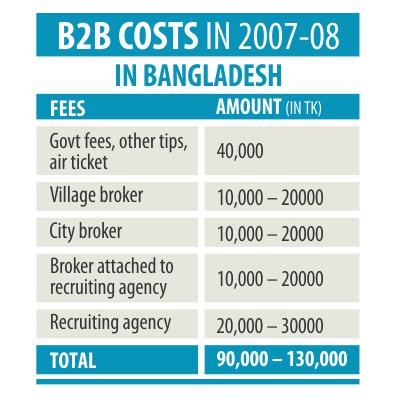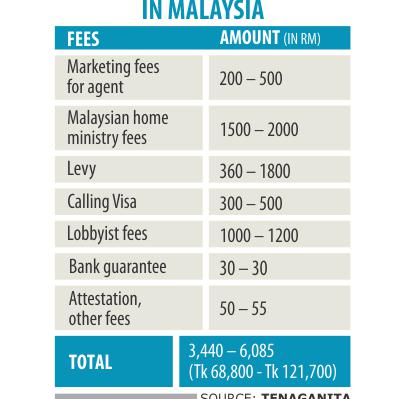It has always been mutual: Malaysia needs workers, and Bangladesh has plenty of them. That's why, Malaysia, after Saudi Arabia, has become the second most sought-after destination for Bangladeshi jobseekers. Given this, a transparent system for labour recruitment could have dismantled the human trafficking chain and also save the lives of hundreds of migrant workers. But why the two countries have so far failed to devise one such mechanism? In the first part of a three-part series, The Daily Star focuses on the elements in both the countries that push for the murky system in order to rake in money.
The government-to-government (G2G) labour recruitment system between Bangladesh and Malaysia was made to fail.
Ever since the G2G became operational, private sector agents in Malaysia lobbied against it and convinced the Malaysian government officials to scrap this reliable and worker-friendly system, according to insiders.
As a result, Malaysia recruited only around 10,000 workers from Bangladesh since 2012 when the two governments signed the G2G deal, whereas over 4 lakh Bangladeshis went to the Southeast Asian country in 2007-08 alone through the private sector, popularly known as the business-to-business (B2B) system.
Eventually, their efforts paid off as the two countries in June decided to revert to the B2B system. Interestingly, the moment the agreement was reached, Malaysia announced it would recruit 1.5 million Bangladeshis within the next three years.
So, how did the private sector businesses pull it off?
 "Soon after the G2G was signed in November 2012, manpower agents in Malaysia sat together and decided to lobby against it," said a broker, who claimed to have been present at the meeting in Kuala Lumpur.
"Soon after the G2G was signed in November 2012, manpower agents in Malaysia sat together and decided to lobby against it," said a broker, who claimed to have been present at the meeting in Kuala Lumpur.
The signing of the G2G came as a huge shock to the agents and sub-agents of both the countries simply because this would deprive them of millions of taka and ringgit that they were making through the B2B system.
"With the G2G signing, all the agents and sub-agents in Malaysia -- Bangladeshi, Malay, Chinese and Indian -- got united and protested it," a Bangladeshi sub-agent told this correspondent during the latter's recent visit to Malaysia.
"The government has issued licenses to the recruiting agents for manpower business, but they are sitting idle. Why? If you recruit workers through the G2G, what will the agents do? Will they wash the licenses and drink that water … ?" said another sub-agent, with clear signs of desperation in his voice.
 The employers in Malaysia too preferred hiring workers through the agents as "this way both the companies and the agents make profits," he said.
The employers in Malaysia too preferred hiring workers through the agents as "this way both the companies and the agents make profits," he said.
So, following strong lobbying by the agents, who are well-connected with those in Bangladesh, and "with help from some [Malaysian] government officials," the G2G was made ineffective, he added.
The experience of sending workers under private management in 2007-08 was a sour one.
During that period, an excessive number of workers were sent to Malaysia. Even name-only companies sprang up to recruit workers and make money out of it.
Many remained jobless after going there. They were sometimes given short-term jobs but were paid either less than the usual or nothing at all.
Thousands of workers crowded the Bangladesh High Commission in Kuala Lumpur and had to spend nights under the open sky. Many had to return home empty-handed and sick.
Amid this situation, Malaysia in early 2009 cancelled 55,000 visas and imposed a freeze on recruitment from Bangladesh.
After a series of negotiations, Bangladesh and Malaysia in November 2012 signed the G2G agreement, aimed at reducing migration cost and avoiding agents' involvement.
A worker now would have to pay only Tk 40,000 to go there, whereas they had to pay, according to a 2007 study by Malaysia-based rights body Tenaganita, between Tk 1.6 lakh and 2.5 lakh under the B2B system. A large portion of the money went to the pockets of agents and brokers.
Under the G2G, Malaysia was supposed to initially recruit 30,000 Bangladeshis in the plantation sector and then gradually extend the sectors. However, barely one-third of the promised number of workers was hired in almost three years.
Apart from the middlemen, the employing companies preferred the B2B system. They have to pay levy to the government from their own pockets for recruiting workers under the G2G, but they could realise the levy money from workers while hiring through private sectors, according to the brokers.
"This is a huge benefit for the employers. But in the G2G, they are deprived of this. So, why should they go for the G2G?" said a broker. Around 90 percent Malaysian companies don't want to pay levy themselves and want to pass it on to the workers, he claimed.
When employers and labour agents are united, the Malaysian government cannot do much, said the broker who has been in Malaysia for a decade now.
"Also, you never know if a section of officials and powerful quarters within the Malaysian government are benefitted from labour recruitment through the private sector," he said, hinting at the collusion between manpower agents and government staff in turning the G2G a failure.
A high official of the expatriates' welfare ministry in Bangladesh said they too were somewhat shocked to see little response, or none at all, from Malaysian employers after the G2G deal was signed.
"We heard powerful lobbies were active in both Bangladesh and Malaysia in proving the G2G ineffective," he said, wishing anonymity.
Ali Haider Chowdhury, senior vice-president of Bangladesh Association of International Recruiting Agencies, said if manpower agents played any role against the G2G, it was from the Malaysian end only.
"However, it's now proved that the government is not efficient in handling the business," he claimed.
Executive Director Dato Shamsuddin Bardan of Malaysian Employers Federation, however, said they were surprised by Malaysia's decision to shift from the G2G to the B2B.
"We preferred the G2G initiative and thought it would be the future mode of recruitment [from Bangladesh]," he told The Daily Star.
He said the reason behind the shift was unknown to him but they had requested the government to review the decision.
- Porimol Palma (The Daily Star, Bangladesh)